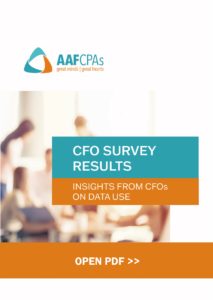 AAFCPAs’ 2021 CFO Survey Finds Data Management Is Catalyst for Change
AAFCPAs’ 2021 CFO Survey Finds Data Management Is Catalyst for Change
The rise of Big Data brought this to the forefront years ago, however the dramatic events of 2020 made data management a mission-critical part of the finance function. Companies across all stages, sizes, and sectors were faced with the question in real time: how can we extrapolate from our data what might be, versus what has been?
AAFCPAs set out to learn more about where CFOs are in this journey. In collaboration with Financial Executives International Boston Chapter (FEI-Boston), we conducted a survey of CFOs to better understand how they are leveraging data to answer key business questions (KBQs) and drive strategic business improvements.
We asked CFOs to:
- Consider high-value Key Business Questions (KBQs) and their potential to impact the business.
- Evaluate their data inventory and processes around data collection.
- Gauge how they are leveraging data to provide actionable insights.
Key Findings:
- CFOs believe that a focus on the future is more important today than it was four years ago.
- Collecting predictive and prescriptive analytics is a pain point for CFOs. These types of data enable a shift from a historical perspective to a forward-looking perspective.
- Limitations in staffing and systems topped the list of major challenges in turning insight into actionable business value.
- 49% of respondents (up from 33% in 2017) said that human resource limitations/team bandwidth is the primary obstacle to meeting CEO expectations
“CFOs told us through this survey that the way they perceive and use data is at a new evolutionary stage,” said James Jumes, Partner and head of Business Process and IT Consulting at AAFCPAs. “The pandemic accelerated the need for different types of forecasting data – but it also accelerated the development of tools that can help interpret it. CFOs have an excellent opportunity to create a competitive advantage by playing a pivotal role in this transformation.”
Who Were the Respondents?
Survey respondents included: Chief Financial Officers, Chief Accounting Officers, Controllers, Treasurers, Vice Presidents of Finance, Vice Presidents of Planning and Analysis, Vice Presidents of Tax, Vice Presidents of Pension Fund Investments, Vice Presidents of Risk Management, Directors of Finance, Taxes, Treasury, Accounting, and Audit Committee members. 80% represent middle market companies in New England, from public and private sector commercial business, nonprofit, and government.

